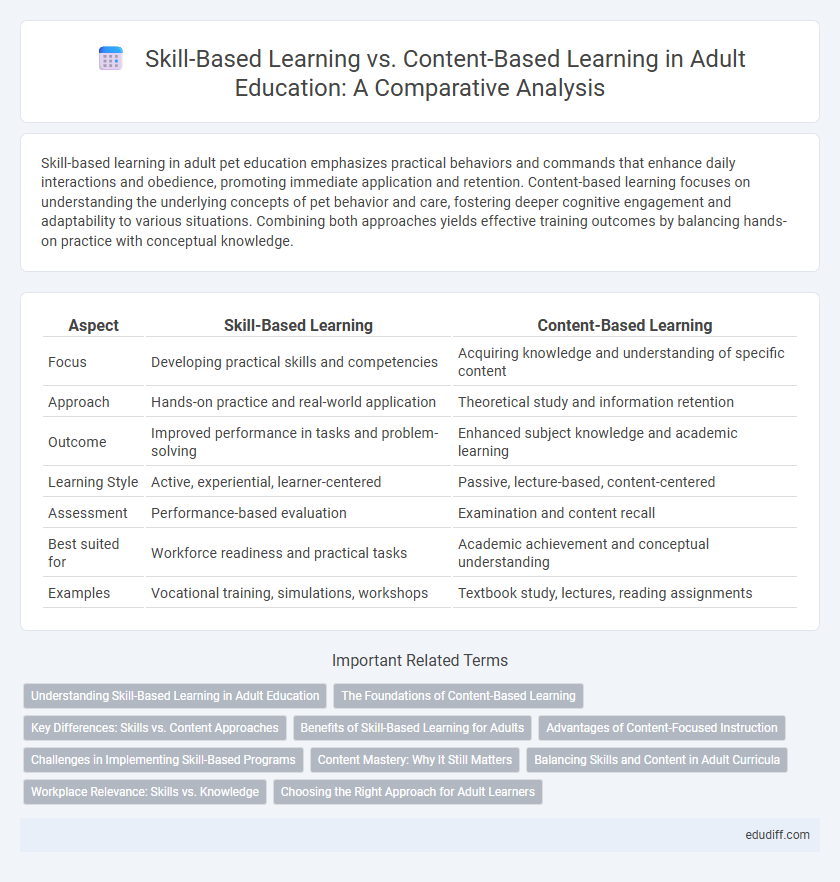Skill-based learning in adult pet education emphasizes practical behaviors and commands that enhance daily interactions and obedience, promoting immediate application and retention. Content-based learning focuses on understanding the underlying concepts of pet behavior and care, fostering deeper cognitive engagement and adaptability to various situations. Combining both approaches yields effective training outcomes by balancing hands-on practice with conceptual knowledge.
Table of Comparison
| Aspect | Skill-Based Learning | Content-Based Learning |
|---|---|---|
| Focus | Developing practical skills and competencies | Acquiring knowledge and understanding of specific content |
| Approach | Hands-on practice and real-world application | Theoretical study and information retention |
| Outcome | Improved performance in tasks and problem-solving | Enhanced subject knowledge and academic learning |
| Learning Style | Active, experiential, learner-centered | Passive, lecture-based, content-centered |
| Assessment | Performance-based evaluation | Examination and content recall |
| Best suited for | Workforce readiness and practical tasks | Academic achievement and conceptual understanding |
| Examples | Vocational training, simulations, workshops | Textbook study, lectures, reading assignments |
Understanding Skill-Based Learning in Adult Education
Skill-based learning in adult education emphasizes practical abilities and hands-on experience, enabling learners to directly apply techniques in real-world situations. This approach prioritizes competency development over theoretical knowledge, enhancing problem-solving, critical thinking, and adaptability essential for workplace success. Vocational training, technical courses, and professional certifications exemplify skill-based learning frameworks that align educational outcomes with industry demands.
The Foundations of Content-Based Learning
Content-based learning centers on integrating subject matter expertise with language acquisition to enhance comprehension and communication skills. This approach builds foundational knowledge through meaningful content, enabling learners to develop critical thinking and apply information contextually. Unlike skill-based learning, which targets specific competencies, content-based learning fosters deeper engagement by connecting language use directly to real-world topics.
Key Differences: Skills vs. Content Approaches
Skill-based learning emphasizes the development of practical abilities such as problem-solving, critical thinking, and communication, enabling learners to apply knowledge in real-world scenarios. Content-based learning centers on acquiring specific information and subject matter expertise, often through memorization and theoretical understanding. The key difference lies in skill-based approaches fostering adaptable competencies, while content-based methods prioritize mastery of factual knowledge.
Benefits of Skill-Based Learning for Adults
Skill-based learning enhances adults' practical abilities by emphasizing real-world application and problem-solving, leading to increased employability and career advancement. This approach fosters critical thinking, adaptability, and independent learning, which are essential for navigating dynamic work environments. Skill-based learning also improves retention and engagement by allowing adults to immediately implement new competencies in professional or personal contexts.
Advantages of Content-Focused Instruction
Content-focused instruction enhances comprehension and retention by providing learners with meaningful, context-rich materials that stimulate critical thinking and real-world application. It supports the development of domain-specific vocabulary and knowledge, enabling adults to engage deeply with subject matter relevant to their personal or professional goals. This approach fosters intrinsic motivation by connecting learning directly to authentic content, thereby improving overall educational outcomes.
Challenges in Implementing Skill-Based Programs
Skill-based learning programs face challenges in adult education due to the diversity of learners' prior experiences and skill levels, requiring highly adaptable curricula. Assessing practical competencies objectively can be complex, often demanding specialized tools and trained evaluators to ensure accurate measurement. Limited resources and institutional resistance to change also hinder the widespread adoption of skill-based methodologies compared to traditional content-focused approaches.
Content Mastery: Why It Still Matters
Content mastery remains crucial in adult education because it ensures deep understanding and long-term retention of essential knowledge, which skill-based learning alone may not provide. Adults benefit from a solid foundation of content to apply skills effectively in real-world scenarios, improving problem-solving and decision-making abilities. Emphasizing content mastery supports comprehensive learning outcomes that enhance professional competence and personal growth.
Balancing Skills and Content in Adult Curricula
Balancing skills and content in adult curricula enhances practical application and deepens knowledge retention, fostering competence and confidence in real-world scenarios. Skill-based learning targets critical thinking, problem-solving, and communication, while content-based learning ensures comprehensive subject mastery and theoretical understanding. Integrating both approaches creates a holistic educational framework that meets adult learners' diverse needs and promotes lifelong learning success.
Workplace Relevance: Skills vs. Knowledge
Skill-based learning prioritizes acquiring practical abilities directly applicable to specific workplace tasks, enhancing job performance and adaptability. Content-based learning emphasizes comprehensive knowledge acquisition, offering a broad understanding that supports critical thinking and long-term professional development. Employers increasingly value skill-based learning for its immediate impact on productivity, while content-based learning remains essential for strategic roles requiring in-depth expertise.
Choosing the Right Approach for Adult Learners
Skill-based learning emphasizes practical abilities and hands-on experiences critical for adult learners seeking immediate application in professional settings. Content-based learning focuses on theoretical knowledge and comprehensive understanding, benefiting adults aiming for deep subject mastery or academic advancement. Selecting the right approach depends on learners' goals, industry demands, and preferred learning styles to maximize engagement and skill acquisition.
Skill-based learning vs Content-based learning Infographic

 edudiff.com
edudiff.com